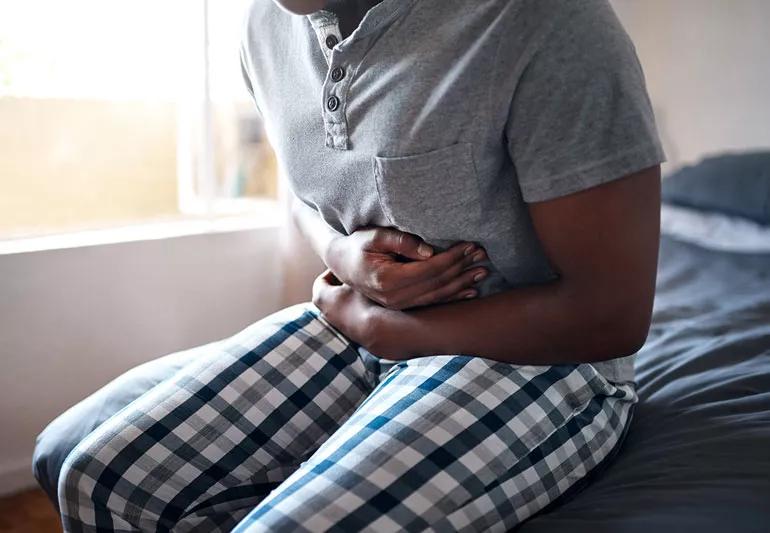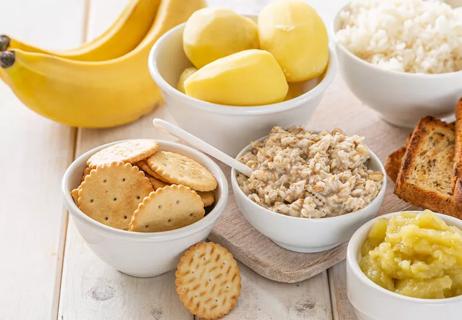Your stress response can wreck havoc on your guts

If you’re experiencing bloating, pain or constipation, chances are you’re feeling stress — either as a cause, a result, or both.
Advertisement
Cleveland Clinic is a non-profit academic medical center. Advertising on our site helps support our mission. We do not endorse non-Cleveland Clinic products or services. Policy
It’s understandable. Maybe of us are experiencing an unprecedented amount of stress right now. With coronavirus causing isolation, job losses and more, it’s difficult to know how to process all of the stress.
We all process stress differently. However stress affects you, internalizing it can lead to chronic health problems like heart disease, hypertension, obesity and depression, says wellness coach and internal medicine specialist Michael Roizen, MD.
He says learning to change your response to stressful events can dramatically improve your health and well-being.
Advertisement
“Many of us respond to stress in a dysfunctional way,” Dr. Roizen notes. “We hope the problem, or stressor, will go away, then treat ourselves to ice cream, simple sugars and carbs, or red meat,” he says. But sweet foods or foods with lecithin, cholines and carnitine will change good gut bacteria to bad, increasing your gut distress and causing a vicious cycle response, he says.
Or maybe you deal with stress in other dysfunctional ways, like shopping, drinking or gambling in order to soothe yourself. Then you have a bigger stress response afterward.
“Handling stress in a functional way begins with the awareness that you’re under stress. Then you can deal with stress in a few different ways,” says Dr. Roizen.
If financial problems are stressing you out, you can set up a budget that helps you make ends meet. Or you can cut up that problem credit card. Then arrange to have your 401K contribution auto-deducted from your paycheck.
If a relationship is difficult but necessary, figure out how to ease the tension. Seek counseling if necessary, for a marriage or family member. Or if it’s a coworker, maybe learn ways to go along with a joke (laughter is a great stress-reliever). Or include a third colleague or friend in your encounters. If the relationship is personal, find a passion you both share to enjoy.
When a stressful situation is unavoidable (and many of them are), you can breathe deeply or meditate through it.
For example, if someone cuts you off in traffic, rather than getting mad, focus your attention on deep breathing in your car. Or you can work out, take a bath, enjoy a walk or do some gardening to calm down. Whatever works for you.
If Uncle Joe always drives you crazy at Thanksgiving or another holiday, make holiday plans with good friends instead, or just avoid Uncle Joe. If you’ve overcommitted yourself to volunteering or to social activities, try cutting back.
Your stress response can wreck havoc on your guts. But if you learn to reframe your responses to stress, it can have a dramatic impact on your health.
“Challenges are part of life,” says Dr. Roizen. “And life’s challenges keep you stimulated, engaged and passionate about who you are and what you do.”
It’s not about living stress-free. It’s about changing your response to stressful situations.
Advertisement

Sign up for our Health Essentials emails for expert guidance on nutrition, fitness, sleep, skin care and more.
Learn more about our editorial process.
Advertisement

Gallstones can block bile in your biliary system and lead to pain and discomfort

Peppermint oil, exercise and a belly massage can help, but for ongoing symptoms, you may need to talk to a healthcare provider

Opt for soft foods or liquids that are rich in protein, calories and vitamins

Delivered through an IV, options can include chemotherapy, immunotherapy or targeted therapy, or a combination

Irritable bowel syndrome has many signs, but lower abdominal pain, constipation and swelling may mean you should see a healthcare provider

Help your aching belly by staying hydrated, eating bland foods and avoiding certain foods

Hunger is the obvious cause, but food quality, and lack of protein and water are also key

Different symptoms call for different menus

Even small moments of time outdoors can help reduce stress, boost mood and restore a sense of calm

A correct prescription helps your eyes see clearly — but as natural changes occur, you may need stronger or different eyeglasses

Both are medical emergencies, but they are very distinct events with different causes